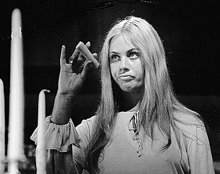East Village hosts annual film jamboree dedicated to experimental, defiant themes
The New York Underground Film Festival raises its customary big tent, gathering together a venturesome array of high-grade experimental, documentary, animation, mondo and otherwise eclectic programming.
In its 12th year, the festival has earned itself a new attitude, the snarkiness of festivals past replaced with a newfound cuddliness.
Asia Argento’s adaptation of J.T. LeRoy’s autobiographical novel “The Heart Is Deceitful Above All Things,” the coming-of-age tale of tender young Jeremiah’s vexatious relationship with his hard-loving mom Sarah, establishes the family-friendly tone right from opening and there’s even a free Saturday matinee children’s show.
On Friday evening, March 11, there’s a nifty, unofficial sidebar of environmental programs. First is the documentary “The Forest For the Trees: Judi Bari vs. the FBI,” a portrait of the late radical activist and Earth First! leader. Bari survived a car-bombing attempt on her life to bring a suit against the FBI, winning a $4 million jury verdict five years after her death from breast cancer.
Michael Gitlin’s outstanding “The Birdpeople,” a meditation on the fate of the ivory-billed woodpecker—a majestic, southeastern species believed extinct—that peels off playful asides about our kinship with other earthlings.
No year of the festival would be complete without something new by James Fotopoulos, the young Chicago auteur whose career has been intimately entwined with the festival. His leering gargoyle head on the festival’s heraldic shield, Fotopoulos is a master of anomie, dread and the grotesque, but this year’s entry, “The Ant Hill,” finds him tapping a less fecund neo-primitive vein. Conducting a cast of intentionally wooden thespians, Fotopoulos shuffles through a notional narrative of a petty tyrant and his hangers-on, three chicks in choir-like white gowns plus one gangly dude, the fifth wheel. For the uninitiated, “The Ant Hill,” an arresting sample of his recent video experiments, doesn’t make Fotopoulos’ best introduction.
Deborah Stratman’s documentary, “Kings of the Sky,” brightens the festival with an excursion among the Uyghurs, the largest of the oppressed ethnic Muslim groups in China’s East Turkistan, shooting this finely etched portrait of tightrope artist Adil Hoxur and his family-run circus troupe as they perform nightly in desert villages. A sweeping miniature epic about the deep enmity between the separatist Uyghurs and their Han Chinese overlords, Stratman’s welcome restraint—in not subtitling her subjects’ every utterance or intruding redundantly with voice-overs—saves the film from being a facile spectacle.
Some of the festival’s choicest offerings are vintage artifacts gleaned from the archive. Guest curator Ariella Ben-Dov, director of San Francisco’s Madcat Women’s International Film Festival, presents two films by Stephanie Rothman, one of the few women making feature releases in the 1970s. Rothman was trained in Roger Corman’s New World Pictures studio, a launch pad as well for the young Jonathan Demme and John Sayles, and he transformed B-grade grind-house fodder into distinctively stylish, proto-feminist romps. The Underground Film Festival screens Rothman’s “Student Nurses” (1970) and the delectable “The Velvet Vampire” (1971), with its teasing Sapphic coquetry. The other historical marvel on display is a New York premiere of Richard Crawford’s “Captain Milkshake” (1970), ensnared for decades in litigation, an anti-war film about a Vietnam vet coming home to a California swept by the counter-culture.
The festival offers many other treats, including Kevin Jerome Everson’s documentary “Spicebush;” a two-part compilation from Holland’s experimental Impakt Festival; a tenth-anniversary tribute to women’s distribution collective Joanie 4 Jackie; and scores of lively shorts leading up to closing night’s surpassingly demented “What Is It?” directed by Crispin “Hellion” Glover.
Beloved for his indelible fringe roles in “Wild at Heart,” “The Doors” and the “Charlie’s Angels” franchise, Glover’s self-financed directorial debut, patiently assembled over a decade, boasts an ensemble that includes actors with Down Syndrome, blackface minstrels, explicit sex scenes and the screams of Fairuza Balk, a talking snail that gets salted by a fur-coated Glover in the garden. Possibly more self-referential than provocative, “What Is It?” mocks middle-class decorum and sends the festival out with a proper Dionysian howl.
The avant-garde planets are in magical alignment over the East Village this Saturday, March 12, because in addition to the New York Underground Film Festival, the Millennium Film Workshop also presents a showcase with experimental artist Stephanie Gray. Contently living in Flushing with her partner, this all-around dyke heartthrob shoots small-gauge Super 8mm film, which she then hand-processes reel by reel, in the process cultivating a signature style over the last several years.
Gray engages pop culture—as in “Kristy” (2003), her soiled valentine to Kristy McNichol—through a working-class feminist consciousness, and the perceptual scrim of deafness/hearing loss, which gives her work its often startling sonic qualities. On March 12 at 8 p.m. at Millennium, 66 East 4th Street, Gray will introduce and discuss, among other films, “I luved this city” (2000), “Only lonely (for Storm de Hirsch)” (2001), “This is the bike ride to work” (2003) and “I bought the last four bagels at Jon Vie Pastries on New Year’s Eve, 2004” (2004).
Here’s a Saturday night special to consider: pause from the Underground Film Festival to dart around the corner to Millennium for Stephanie Gray’s show, then grab some refreshments and scoot back to Anthology for “The Velvet Vampire.” That’s one uncommonly good night at the movies.
gaycitynews.com



































